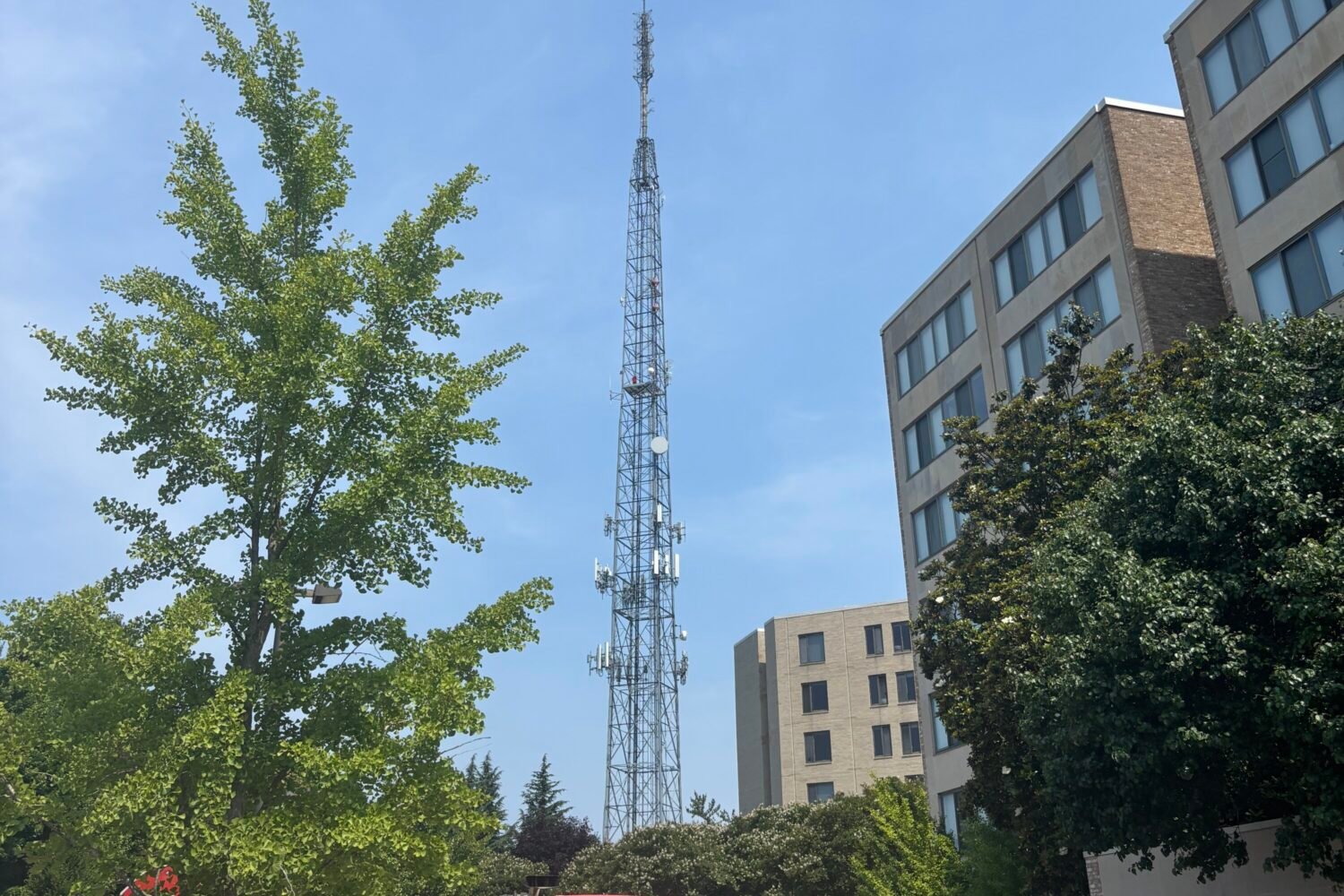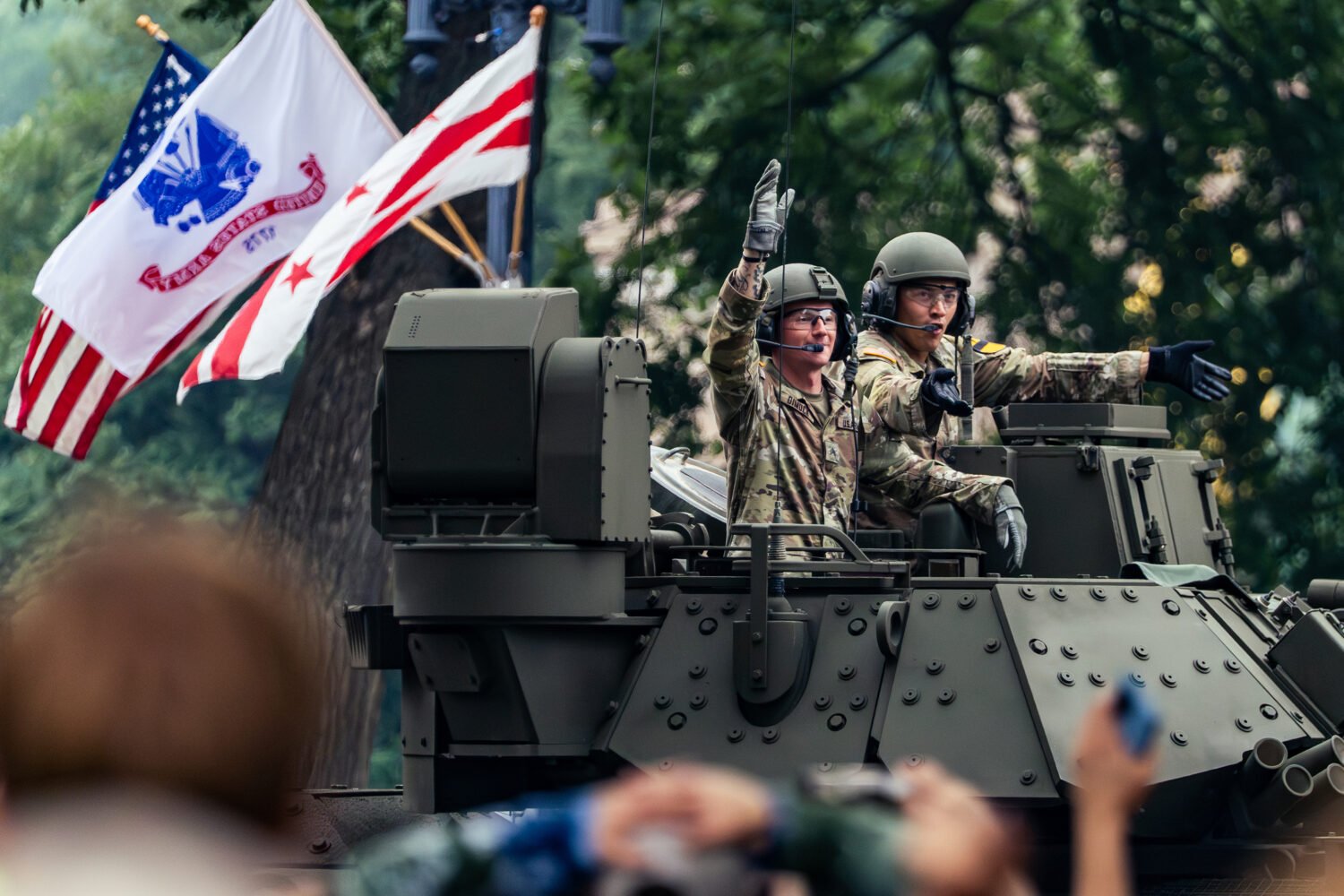A David Baldacci thriller starts with a “what if.”
What if a thief is burglarizing a Washington mansion and accidentally sees a murder?
What if a genius discovers how to fix a lottery and decides to pick winners so he can play puppet master with their lives?
What if a Secret Service agent looks away for a split second, and in that split second . . . ?
And what if a guy practices corporate law in Washington for nine years and tells no one but his family that he’s writing a novel? Then what if he sells it to a publisher for so much money—$2 million plus $2.5 million in film and foreign rights—that he can burn his law books?
That last scenario, Baldacci says, breaks the cardinal rule of mystery writing: The story has to be plausible to the average reader. But it happened to him—even though he found it hard to believe.
After he sold his first novel, Absolute Power—about a jewel thief who’s the unwilling witness to a crime involving the President of the United States—Baldacci went back to work as a lawyer at the DC firm Holland & Knight.
“He called me and said he had big news,” his friend and law client David Broome recalls. “I thought he had made partner.”
Thirteen years and 14 books later, David Baldacci, 47, is no longer a practicing lawyer or stealth novelist. Most of his books are thrillers—including The Collectors, Last Man Standing, and Split Second—and every one has been a bestseller.
The nonthrillers include The Christmas Train, a comic adventure about a journey across the United States. It’s in part an homage to Mark Twain, Baldacci’s favorite author. The hero claims kinship with Twain and is inspired to go cross-country by train because Twain once made a similar trip.
Baldacci has also written Wish You Well, a historical novel based on his mother’s rural-Virginia family, and two children’s books in the Freddy and the French Fries series.
His books have been translated into more than 40 languages, and more than 50 million copies are in print.
This spring’s Simple Genius—featuring ex–Secret Service agents turned investigators—was number one on the New York Times and Washington Post bestseller lists a week after it hit bookstores.
In November, Stone Cold will be released. It’s the latest in his series about a group of aging Washington misfits who call themselves the Camel Club and are surprisingly adept at uncovering dirty deeds in high places.
Baldacci lives with wife Michelle, daughter Spencer, 14, and son Collin, 11, in Vienna. By Great Falls or Potomac standards, the neighborhood is low-key. There are no McMansions, no tree-lined driveways behind iron gates or horse fences and vast lawns.
Baldacci’s house, hidden behind elaborate landscaping, is bigger than it looks from the street. The rooms are filled with family pictures and the Disney memorabilia Michelle collects. The great room overlooks a yard terraced downward to accommodate three decks, a swimming pool, and a gazebo/pool house. Downstairs is a state-of-the-art gym that Baldacci uses almost every day.
Then there’s the Ping-Pong table. Baldacci, competitive in every arena, is ferocious at Ping-Pong, according to friend and former neighbor Bob Schule. During one game, Baldacci was hitting backhands so hard that he repeatedly cut his hand on the table. Another neighbor, urologist Anshu Guleria, was nearby. It took 11 stitches for Guleria to close the cuts.
On the first floor, Baldacci has a study with a desk, a computer, and a suit of armor to provide inspiration for tales about heroic deeds. But he rarely writes there.
He used to work at home, but it was hard for the family, Michelle says. When the kids were young, they couldn’t understand why Dad couldn’t be interrupted. Plus the house was overwhelmed with boxes of research and letters from fans.
Now Baldacci works out of a suite of offices in Reston. Deborah Hocutt handles his schedule, travel, and public relations. She used to work for the Library of Congress. Michelle’s mother, Lynette, is his receptionist.
He doesn’t always write here, either. “The only perfect place to write is in your head,” Baldacci says. Michelle jokes that she warns neighbors to disregard him if they see him wandering the streets.
Baldacci keeps no set schedule—he writes in bursts, sometimes in longhand on legal pads—and does his own research. For Last Man Standing, about a hostage-rescue team, Baldacci learned to ride a horse and shoot a machine gun. But weapons don’t interest him. Most of the complaints he gets from readers are about the little mistakes he makes about guns.
“Any writer can write about hardware,” he says. “Besides, what I’m writing is fiction.”
What does interest him is creating a scenario and seeing how his characters react to it. Will the jewel thief flee to safety, or will conscience keep him in Washington to see that the villains get their just desserts? What happens to a Secret Service agent after the President is kidnapped on his watch?
Baldacci also owns a house on Smith Mountain Lake in Virginia’s Blue Ridge Mountains. Since he bought the place, boats have become his passion, Schule says. Boating magazines are all over the house. For Michelle’s 40th birthday, Baldacci surprised her by chartering a yacht and flying friends to the Virgin Islands to sail around the Caribbean.
This is the life that bestsellers built, and it’s a far cry from his childhood in Richmond. “We both had working-class backgrounds,” Broome says. “He never forgets where he came from.”
Everyone interviewed says Baldacci is the same down-to-earth guy they knew before Absolute Power.
“He’s just an ordinary guy,” says his sister, Sharon Baldacci. “He’s not impressed with himself at all.”
He and Michelle still attend the same church, St. Leo in Fairfax, where they were married. The difference is that when the church holds an auction now, a lunch with Baldacci raises the most money.
Baldacci’s father, Rudolph, was a trucking foreman. “He lost 70 percent of his hearing in World War II,” Sharon remembers, “and he worked hard to compensate for it.”
The year Sharon started college, the company their father worked for went belly-up. But the family persevered.
“By then, Mother was working—and Dad got another job,” Sharon says. “They helped us all through college and helped David through law school.”
David was the youngest of three. His older brother, Rudy, is an artist who illustrated the first Freddy and the French Fries book. Sharon was a journalist in Richmond until she was diagnosed with multiple sclerosis. She has written a book, A Sundog Moment, about coping with the disease. David is a national ambassador for the National Multiple Sclerosis Society, helping to raise money for research.
Sharon remembers David as a bratty little brother. “He would jab us, poke us, and say, ‘Hit me.’ Finally I’d punch his arm, and he would go screaming to Mom.
“He was so manipulative,” she jokes, “I just knew he would be a lawyer.”
Baldacci had a prodigious memory and made his brother and sister quiz him about Civil War history. “If he got one thing wrong,” Sharon says, “he’d go back and study again.”
He still delights in obscure facts, and they’re sprinkled throughout his books. In The Camel Club, he casually mentions that “Hail to the Chief” is played before the President enters a room because Mrs. James K. Polk was upset that her small husband was often ignored when he made an entrance. She ordered that the band strike up “Hail to the Chief” so it would be impossible to ignore President Polk.
Young David was such a teller of tall tales that his mother bought him a composition book so he could record them.
“I was a writer before I was a lawyer,” he says.
In the Baldacci family, the kids always worked. David would later attribute his ability to write from 10 pm to 2 am—after a day of practicing law—to his experience as a newspaper delivery boy: Between ages 11 and 18, he got up every morning at 3.
Rudy, Sharon, and David went to Virginia Commonwealth University in Richmond. “We took lots of jobs to pay for school,” Baldacci says, “and we all graduated with no college debt.”
He worked nights as a Pinkerton guard at a General Electric plant, arriving on campus still wearing his uniform. He worked construction, built fences, washed and detailed 18-wheelers, and did golf-course maintenance.
“My job was to stand on the course with a hose on my shoulder, watering fairways,” he says. “I really hoped to graduate to riding one of the machines that cleaned out sand traps, but it never happened.”
The job that may have done the most to shape his future was selling Filter Queen vacuum cleaners. The machines weren’t cheap—$800 each. Baldacci became the best salesman in Richmond. He also learned to “read” the customers; part of his job was deciding on the spot whether to offer to sell the vacuum on credit.
By his junior year at VCU, he felt he had to get serious about a career. He decided to go to law school because “if I could sell a vacuum cleaner, I could sell a jury.”
Baldacci’s experience at University of Virginia law school was not what Mr. Jefferson would have envisioned. He lived in a ratty apartment on Hydraulic Road in Charlottesville and rarely socialized. He didn’t talk much; he eavesdropped. Instead of moot court and law review, he spent his spare time writing stories.
He fell in love with a variety of writers from John Irving to Garrison Keillor to Anne Tyler and tried to emulate their styles. He sent out a lot of short stories and collected a lot of rejection slips.
His legal prospects were brighter. After his second year at UVa, he was a summer associate at DC’s Casson, Calligaro & Mutryn. The firm offered him a job as an associate doing research, and he started immediately. He moved back to Richmond, arranged his law-school classes for Monday, Tuesday, and Wednesday, and commuted to the firm Thursday and Friday. After graduation, he moved to Alexandria and began to practice law in earnest.
At about the same time, he switched from short stories to screenplays. He had an idea for a movie—a kind of Die Hard at the White House. One of his fellow lawyers was from Los Angeles, and Baldacci had heard that movie studios often employed college kids as script readers. It turned out that one of his colleagues had been a reader at Paramount. She introduced him to her friend Karen Spiegel. Years later Spiegel produced the movie version of his novel Absolute Power.
Strong women have played important roles in Baldacci’s life—and his books. The women he writes about are more than sexual diversions. No Bond girls need apply.
Says Baldacci: “I don’t write about damsels in distress because I don’t know any.”
The fact that one of his strongest protagonists bears his wife’s first name is no accident. Michelle Collin Baldacci is not a silent partner. She made that clear the day they met at a barbecue thrown by two vegetarian chefs. She heard him waxing on about his work as an attorney. Michelle, a paralegal, was not impressed. She tapped him on the shoulder and said, “I wouldn’t be bragging about that,” then walked away.
“I was mesmerized,” Baldacci recalls.
On their first date, he took her to lunch at Nathans in Georgetown. He was so nervous that he brought six ties to the office and asked a friend to help him choose. Lunch lasted 3½ hours.
They dated for a little over a year, were engaged for six months, and planned to marry in September 1990. The wedding was moved up to May; Michelle’s brother played football for the University of Kansas, a Collin family priority.
They moved into Alexandria’s Kingston neighborhood. Their two children were born while they lived there.
When his legal mentor, Bill Mutryn, moved to a bigger law firm, Holland & Knight, Baldacci went with him. The move meant that Baldacci, a partner before, was bumped back to senior associate.
“He knew it would only be for a short time and he’d do better as an associate at the big firm,” Mutryn says.
Baldacci was calm, rational, but very tenacious, according to Mutryn. A large part of their practice involved contracts, mergers, and acquisitions: “He was a very good writer and a good negotiator.”
Baldacci took on pro bono cases. One of the people he represented was an elderly woman whose assets had been stolen by her caretakers. Baldacci went to court, got an injunction, had the money returned, and won a judgment against the victimizers.
“It was all done on his own time,” Mutryn says.
In November 1994, Baldacci sent the manuscript for Absolute Power to eight literary agents. Aaron Priest was one of them. “As soon as I read it,” Priest says, “I was excited to meet this guy.”
It was late on a Tuesday when Priest sent the novel to about a dozen publishers. When he got to work Wednesday, he had a call from Larry Kirshbaum, CEO of Time Warner Books, who made a preemptive offer. Priest says it was “an offer too good to refuse.”
Baldacci called Michelle from New York to tell her. “Are you sitting down?” he said. “The book sold.”
She said, “Did you have to pay anyone to publish it?”
Within weeks, he was back in New York, on a pay phone in Penn Station, listening in as Hollywood bid for movie rights.
It never occurred to Baldacci or his wife that he’d quit his job. For one thing, he felt he owed Bill Mutryn. And what if he never sold another book?
On the train back, he considered how he’d tell the firm about the book and movie deals. He needn’t have bothered. He was featured the next morning on the front page of the Wall Street Journal.
Absolute Power is the only one of Baldacci’s books to make it to the movies. His novels are plot-driven—the story comes first, the characters second—but he knew that readers had to care about jewel thief Luther Whitney for the plot to work.
Clint Eastwood directed and starred in the movie as Whitney. Eastwood loved the character but insisted that the ending be changed for the film. He told Baldacci: “I don’t die in movies.”
The Christmas Train is in production for a movie on the Lifetime channel. There have been discussions about turning The Camel Club into a TV series, but Baldacci isn’t optimistic: His characters are senior citizens, and “nobody on network TV can be over 48.”
Michelle Baldacci read Absolute Power as David was writing it. While he worked at his law-firm job, she edited.
Michelle still reads drafts “to make sure he doesn’t have people wearing corduroy in July,” she says. She’s more involved with the Wish You Well Foundation, founded by the Baldaccis in 2002 to fund programs promoting family literacy. It has donated about $500,000 to projects ranging from the DC-based Barbara Bush Foundation for Family Literacy to Big Creek People in Action, based in McDowell County, West Virginia.
Last year, the Baldaccis started a new program with America’s Second Harvest, a national network of food banks, and his publisher’s parent, Hachette Book Group. The program, called Feeding Body & Mind, is aimed at encouraging needy families to read. “Poverty and illiteracy go hand in hand,” Baldacci says.
He brings boxes to his book signings and asks people to fill them with donated new and gently used books. Once the boxes are filled, Hachette pays to ship them to community feeding programs to be handed out.
When the program started, Hachette donated 500 children’s and adult books to food banks and ran full-page ads in USA Today and local papers before Baldacci’s appearances. In three months, he collected 35,000 books.
In many ways, Baldacci is a publisher’s dream—he writes thrillers. Mysteries and thrillers account for a third of the books on bestseller lists.
Baldacci also had the benefit of terrific timing. After decades of thrillers focused on conflicts with the Soviets, American readers were ready to come in from the cold. Baldacci was one of the new writers focused on threats closer to home.
Thrillers have even more appeal now, according to Sara Nelson, editor of Publishers Weekly. Baldacci doesn’t claim prescience in focusing Simple Genius on the CIA, but Nelson says, “Anything that involves the CIA is going to be popular. Terrorism is on people’s minds. For the first time since the Cold War, we have intelligence issues.” She finds Baldacci’s books “very well paced an un-put-downable.”
Baldacci is as prolific a talker as he is a writer. Many writers are comfortable meeting the public only through their books. Baldacci’s experience as a trial attorney has made him a polished performer. “You have to keep your name out there,” he says.
It doesn’t hurt that he’s good-looking; his chiseled features and honed physique earned him a place on People’s most-beautiful list in 1997. And he has perfected his writer’s uniform—casual but not sloppy. He typically wears jeans, black shoes, a button-down shirt, and a blue blazer.
When Baldacci spoke to a sold-out crowd at the Smithsonian in May, his audience included men and women ranging in age from twenties to seventies.
Critics don’t always love Baldacci—in a Washington Post review of Hour Game, Patrick Anderson wrote that “readers who prefer thrillers that offer logic, style, plausibility or depth should look elsewhere”—but Baldacci’s fans at the Smithsonian weren’t interested in what reviewers say. They knew he’d deliver a good read with lots of local references—an insider’s guide to Washington power.
That night, he talked about his research on the CIA’s secret installation Camp Peary, the setting for Simple Genius.
“When my assistant called the agency,” he said, “she was told that the CIA neither confirms or denies the existence of the place. But there’s a sign on the interstate. How secret can it be?”
So Baldacci went to eastern Virginia, parked on the opposite side of the York River from where Camp Peary is located, met one of the locals, and said he was interested in buying riverfront property. Pointing toward the prime location across the river, Baldacci asked, “Is that a golf course?”
“No, that’s the secret runway,” he was told. The locals all knew when some big operation was under way because the “secret runway” became as busy as Friday night at Reagan National.
When Baldacci wrote about Camp Peary in the book, he used a qualifier: After describing the ability of the “ultra-secretive training center for CIA agents” to spy on locals, he wrote that “no one has proven that this is so, but it was very true that no visitor ever left the area without hearing the story at least three times.”
“I do this with agencies that might come after me,” he told his audience.
Baldacci also related a story about the Reston office building where he works. It’s across from a secured Lockheed Martin facility. Guard dogs patrol the area. Next door is the headquarters of the National Geospatial Intelligence Agency. Behind Baldacci’s building is the Homeland Security Agency.
A woman named Lillian worked in Baldacci’s building, although he was never sure what she did. She seemed to spend most of her time walking around. One day, a SWAT team from Homeland Security came into the building, grabbed Lillian, and accused her of being a spy.
They were right—but not for the reason Homeland Security suspected. The Lockheed building appears to be made of glass but has no windows. “Lockheed hired Lillian to stay in our building so she could see who was watching their building,” Baldacci says.
In The Camel Club, Baldacci describes a national intelligence center in Virginia: “The main building looked like it was all glass with a commanding view of the Virginia countryside. There actually wasn’t a window in the place. Behind the glass panes, the bunker-thick concrete walls, lined with specialized material, prevented human or electronic eyes from peering in.”
The story doesn’t sound credible, but Baldacci would say that truth is stranger than fiction. The Camel Club also mentions torture in secret government-run prisons. He got hate mail and death threats after it was published. Three years later, secret CIA prisons were revealed on the front page of the Washington Post.
















